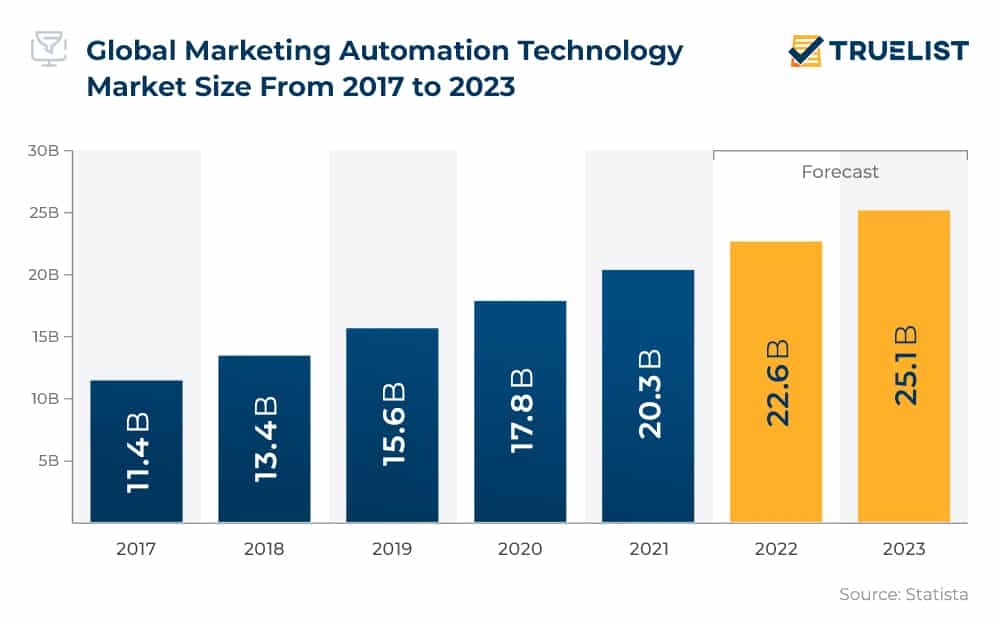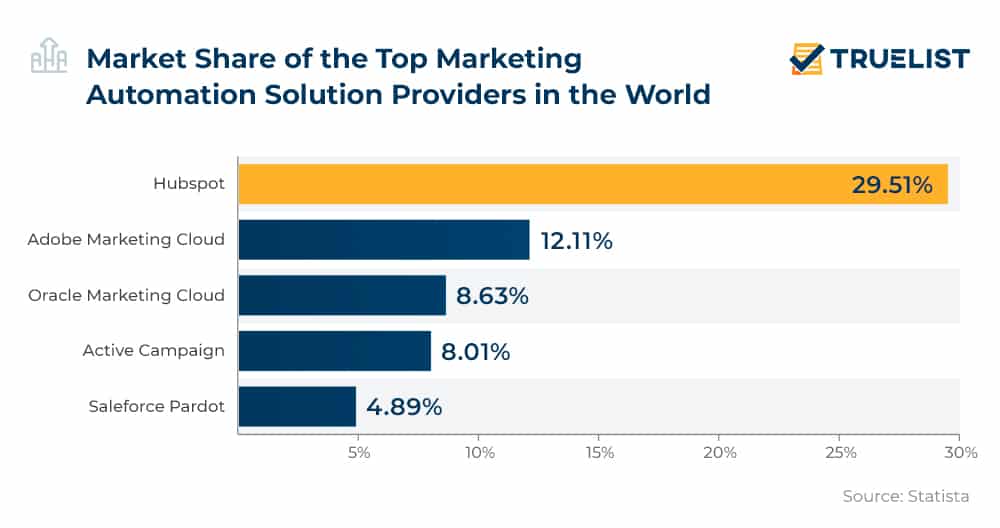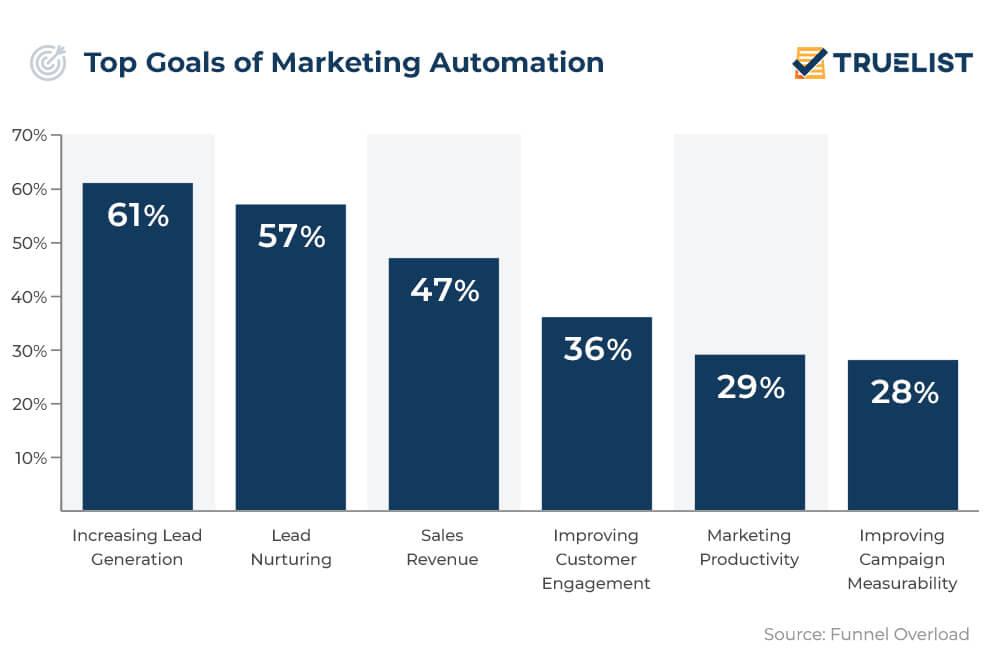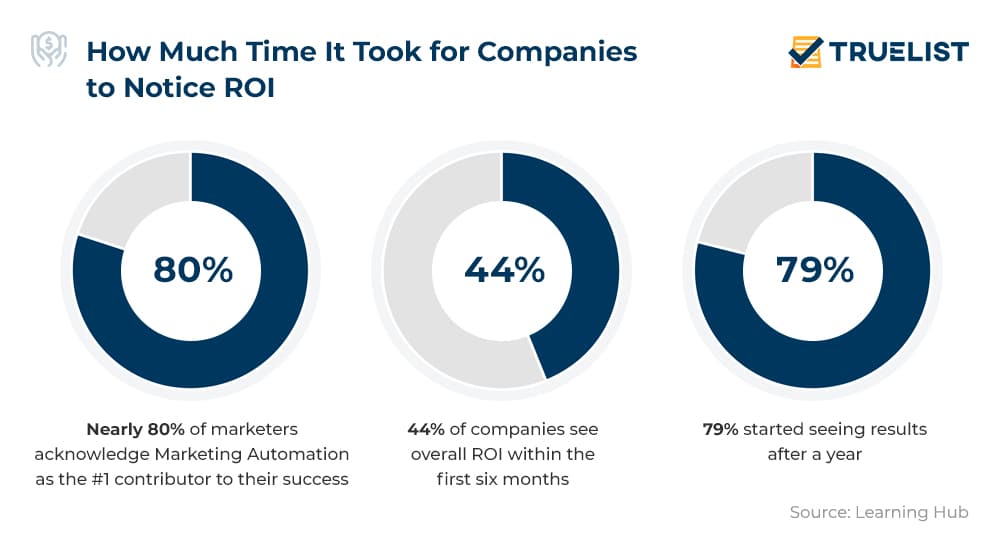Marketing automation is the talk of the town nowadays, and for good reason. Marketing automation statistics show that by reducing and even eliminating repetitive tasks, technology can take you to the top of your niche. Delivering the right message to the right person at the right time is crucial for every marketer’s success, but remains a cherished goal for many professionals working in the area. If you are new to this astonishing new technology, our list of selected stats and facts is a great place to start. Let’s dive in!
Marketing Automation Statistics (Editor’s Picks)
- The global marketing automation technology market is projected to reach $25.1 billion by the end of 2023. (Statista)
- 90% of marketers regularly use more than one form of marketing automation software. (Learning Hub)
- By 2026, the marketing automation software market is projected to top $19.66 billion. (Mordor Intelligence)
- 61% of marketers use marketing automation to generate more leads. (Funnel Overload)
- Nearly 80% of marketers acknowledge marketing automation as the #1 contributor to their success. (Marketo)
- Businesses that use marketing automation are 20% more productive. (Funnel Overload)
General Marketing Automation Stats & Facts
1. The global marketing automation technology market is projected to reach $25.1 billion by the end of 2023.
In 2017, the global marketing automation market was $11.4 billion. With time, marketers started realizing the benefits of marketing automation and investments started growing at an average of $2 billion per year, topping $15.6 billion at the end of 2019.
(Statista)

2. Marketing automation stats reveal three-quarters of companies use some kind of automation tool.
Data shows that marketing automation tools have enabled a massive 75% of businesses to focus on more important matters. For the time being, only a quarter of businesses have not created a marketing automation strategy.
(Funnel Overload)
3. 91% of marketers say marketing automation software is “essential” for their business.
Recent marketing automation statistics show that the vast majority (91%) of marketers recognize the importance and flexibility of such tools. Investing in marketing automation frees up valuable time in their busy schedules, which they can use to work on other important aspects of their campaigns.
(InvespCRO)
4. HubSpot is the leading marketing automation solution provider in the world.
HubSpot leads the pack as the most widely used marketing automation solution. Globally, 29.51% of industry professionals use HubSpot. Marketing automation industry stats point to Adobe Marketing Cloud with 12.11% as the second-best, while Oracle Marketing Cloud with 8.63% is ranked third. Other platforms used around the globe are Active Campaign, Salesforce Pardot, Marketo, etc.
(Statista)

5. 90% of marketers regularly use more than one form of marketing automation software.
There are more than 100 marketing automation platforms out there. This type of software has become so popular and effective that the vast majority of marketers, or as marketing automation stats would have it, a staggering 90% today use at least one such tool regularly. So if you are one of the remaining few who aren’t yet taking advantage of campaign-saving automation tools, now is as good a time as any to start working on finding the right fit.
(Learning Hub)
6. 40% of marketers who don’t use marketing automation plan to adopt it soon.
Marketing automation facts and figures show that only about 10% of companies who have not adopted marketing automation yet have no plans to invest in it. Nearly half meanwhile are unsure whether or not they would put money into such tools.
(Funnel Overload)
7. By 2026, the marketing automation software market is projected to top $19.66 billion.
The marketing automation software market, which in 2010 was estimated at $6.87 billion, is set to reach an incredible $19.66 billion in 2026, according to marketing automation software stats. The registered CAGR between 2021 and 2026 will be 19.2%. The growing importance of marketing in generating sales and retaining customers has led to the unstoppable rise of marketing automation. In fact, the marketing automation software industry has become one of the fastest-growing.
(Mordor Intelligence)
8. More than 60% of companies outsource all or part of their marketing automation strategy planning.
Marketing automation statistics reveal that 37% of companies today rely solely on in-house resources for this part of their business. 12% prefer to hire a specialist to take care of this. Industry trends also mention more than half (51%) of companies opt to combine in-house and outsourced resources for the task. Then, for 11% of business marketing automation is too expensive, while 22% believe it is pricey but worth it. Nearly half of users (47%) think it has a fair price, and for 10% it is not expensive at all.
(Email Monday)
9. More than 6 out of 10 marketers plan to increase their marketing automation budget for next year.
The latest marketing automation trends show the satisfaction from using automation processes in marketing campaigns is growing. Marketers absolutely love this type of marketing because it saves time, increases customer engagement, provides more timely communication, and above all, offers better opportunities for both parties. This is why a massive 63% of marketers intend to invest more money in building an even more powerful automation strategy.
(InvespCRO)
Marketing Automation Benefits
10. Marketing automation generates 451% more qualified leads.
Lead generation has always been among the most coveted marketing automation results. Sales automation statistics indicate that—compared to companies that focus solely on using blast email software—businesses that employ marketing automation software are twice as impactful in lead generation. Using sales marketing automation software offers your prospective clients the information they need not only to move down the sales funnel but also to arrive at a buying decision. In other words, it shortens the sales cycle.
(Moosend)
11. 61% of marketers use marketing automation to generate more leads.
For the vast majority of marketers (61%), the main goal for using automation in their marketing efforts is to generate more leads. Automation statistics also reveal that marketers are exploiting the benefits of marketing automation to nurture leads (57%), boost sales revenue (47%), improve engagement rates (36%), and marketing productivity (29%). Automated marketing campaigns, according to 28% of marketers, improve their campaign measurability.
(Funnel Overload)

12. 74% of marketers say saving time is the most important benefit of automation software.
The majority of marketers (74%) agree that while saving time is the most significant benefit of marketing automation, it’s far from being the only one. According to marketing automation industry statistics, 68% of marketers believe customer engagement is a direct consequence of marketing automation. Another 58% cite more timely communications with customers as yet another direct benefit. Lastly, the same percentage (58%) report that upselling, along with opportunities, is one the most valuable results of using marketing automation software.
(Gain App)
13. You can generate an over 10% increase in revenue within 6-9 months if you automate your lead management.
According to marketing automation ROI statistics, businesses that rely on an automated marketing solution to manage leads witness a 10+% revenue increase within 6-9 months from their adoption. A single marketing platform can replace the manual work of 10 people working full time to categorize every 1,000 leads on average.
(Automate Online)
14. Nearly 80% of marketers acknowledge marketing automation as the #1 contributor to their success.
Marketing automation ROI statistics further mention that 44% of companies that have fully implemented automation in their marketing process see overall ROI within the first six months, while 79% say they started seeing results after a year. In addition to lead management, marketers use open rate, click-through rate, and unsubscribe rate as one of the key metrics to measure marketing automation ROI.
(Marketo)

15. Nearly 60% of marketers believe upselling is one of the most important uses of marketing automation.
Marketing automation is not only helping marketers save time; sales automation statistics indicate that a solid 58% of marketers enjoy increased upselling opportunities through automated marketing campaigns. As a common marketing tactic used to make customers buy more than what they originally intended, upselling and marketing automation are a match made in heaven. And according to marketers, it is one of the main reasons why they use marketing automation.
(Moosend)
16. A whopping 83% of marketers render social media post scheduling most suitable for automation.
Social media marketing automation statistics confirm that this type of marketing is best suited for scheduling posts on social platforms. Almost 9 out of 10 marketers agree that Facebook, Twitter, Instagram, and other social networks are the most popular application of marketing automation. Email marketing stats meanwhile reveal that emails are voted second-best by 75% of marketers.
(Funnel Overload)
17. Email automation is the #1 most popular marketing automation type.
Although social media automation is considered the most suitable, automated email marketing, as automation statistics would have it, it is the most popular among marketers. In fact, it is used by 64% of marketers who claim that it gives them a 152% higher click rate and a little over 70% higher open rate compared to any other broadcast message. Companies relying on automated email marketing are 133% more likely to send relevant content.
(Wishpond)
18. Businesses that use marketing automation are 20% more productive.
Boosting leads and conversions might be the ultimate goal for most businesses but perhaps one of the most revealing marketing automation facts is that it improves productivity by an average of 20%. Considering it is a major time-saver, investing in a stellar marketing automation strategy will most probably mean you are investing in a more productive team.
(Funnel Overload)
Conclusion
Nowadays, marketing automation is not just an innovative methodology, but an absolute must for big and small businesses alike. Implementing an automation platform that will boost your sales and improve your efficiency is easier than ever. And as these marketing automation statistics prove, it helps to never miss those valuable leads and nurture them along on your way to success. You can also check out some good marketing automation examples to get the bigger picture.
Sources: Statista, Funnel Overload, InvespCRO, Statista, Learning Hub, Mordor Intelligence, Email Monday, Moosend, Gain App, Automate Online, Marketo, Wishpond

